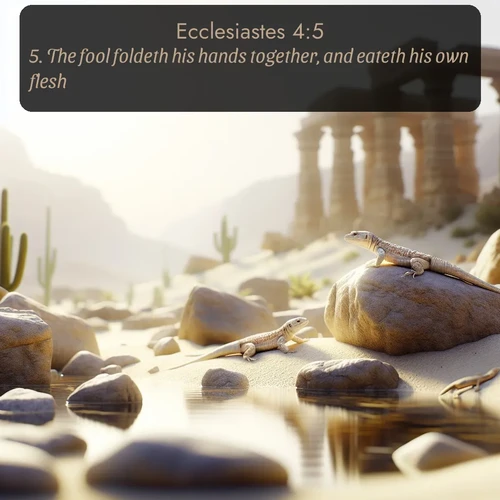Ecclesiastes 4:5 plusieurs versions / traductions
English Bible Translations
5. The foolish man, folding his hands, takes the flesh of his body for food.
German Bible Translations
French Bible Translations
Versions with Strong Codes
Ecclesiastes 4 / KJV_Strong5.
Strong Code definitions
H3684 kciyl kes-eel' from H3688; properly, fat, i.e. (figuratively) stupid or silly:--fool(-ish).see H3688
H2263 chabaq khaw-bak' a primitive root; to clasp (the hands or in embrace):--embrace, fold.
H853 'eth ayth apparent contracted from H226 in the demonstrative sense of entity; properly, self (but generally used to point out more definitely the object of a verb or preposition, even or namely):--(as such unrepresented in English). see H226
H3027 yad yawd a primitive word; a hand (the open one (indicating power, means, direction, etc.), in distinction from H3709, the closed one); used (as noun, adverb, etc.) in a great variety of applications, both literally and figuratively, both proximate and remote (as follows):--(+ be) able, X about, + armholes, at, axletree, because of, beside, border, X bounty, + broad, (broken-)handed, X by, charge, coast, + consecrate, + creditor, custody, debt, dominion, X enough, + fellowship, force, X from, hand(-staves, -y work), X he, himself, X in, labour, + large, ledge, (left-)handed, means, X mine, ministry, near, X of, X order, ordinance, X our, parts, pain, power, X presumptuously, service, side, sore, state, stay, draw with strength, stroke, + swear, terror, X thee, X bythem, X themselves, X thine own, X thou, through, X throwing,+ thumb, times, X to, X under, X us, X wait on, (way-)side, where, + wide, X with (him, me, you), work, + yield, X yourselves.see H3709
H398 'akal aw-kal' a primitive root; to eat (literally or figuratively):--X at all, burn up, consume, devour(-er, up), dine, eat(-er, up),feed (with), food, X freely, X in...wise(-deed, plenty), (lay) meat, X quite.
H853 'eth ayth apparent contracted from H226 in the demonstrative sense of entity; properly, self (but generally used to point out more definitely the object of a verb or preposition, even or namely):--(as such unrepresented in English). see H226
H1320 basar baw-sawr' from H1319; flesh (from its freshness); by extension, body, person; also (by euphem.) the pudenda of a man:--body, (fat, lean) flesh(-ed), kin, (man-)kind, + nakedness, self, skin.see H1319
Prédications qui analysent les thèmes Ecclésiaste 4
Thèmes : Inutilité des efforts ; Solitude de l'homme ; Valeur de l'amitiéRelated Sermons discussing Ecclesiastes 4
Themes : Inutilité des efforts ; Solitude de l'homme ; Valeur de l'amitiésee also: Bible Key Verses ; KJV Bible Images, BBE Bible images

